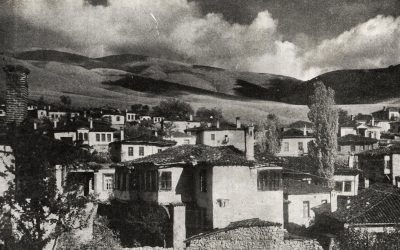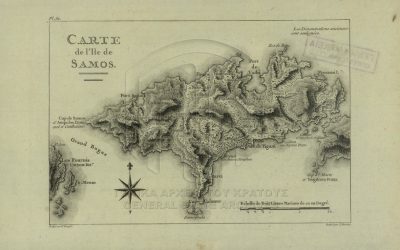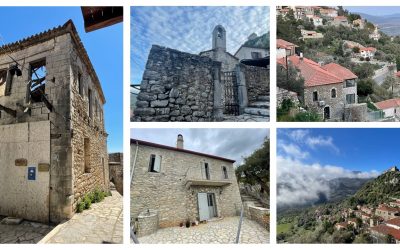By Alexandra Kiritsy
Mysteries are contained within all of our genealogies. Sometimes we are fortunate enough to crack them, but all too frequently, the nature of time and space seem to veil the truth forever.
Today on Yiayia & Me, we’d like to share one of these mystery stories with you all, which was provided to us by one of our readers! It involves a young boy who, in 1943, was ripped away from his family in Greece never to return home again. For the descendants of this young boy, the search for answers—such as his birth name, parents’ names, and birth place—has been an ongoing and difficult endeavor. That being said, we hope by publishing the story here on our blog that we may spread the word and perhaps someday assist the family in uncovering the truth. Thus, we kindly ask our readers to please share this article and request that if anyone has any hints or relevant information regarding the following story to please contact us. Thank you very much for reading!
Our story begins in 1943, during the Second World War, when a group of around 16 young children from Macedonia, Greece, were removed from their homes and taken to Northwestern Bulgaria. Our protagonist, whom we will call by his supposed birth name, Dimitrios, was one of these children and was only a toddler at the time, between 2 and 3 years old. Because of his young age, he was never quite able to recall the circumstances or details of his departure from Greece and arrival in Bulgaria. However, what is known is that in 1944 these children were brought to the town on Valchedram, presently in the Montana Province of Bulgaria. When Ivaylo, Dimitrios’s son, visited Valchedram in 1993 and spoke with locals, he discovered that some of them still remembered these children and specifically recalled how they spoke a different language! You might then be asking “Why were these Greek children snatched and brought away to another country? How might the war have played a role in this event? Were they ever returned home?” Unfortunately, this article can only properly answer the last of these questions, but again, it is our hope by publishing this information that answers and knowledge may someday rise to the surface.




After 1946, some of the children had been displaced to other countries in Eastern Europe, but Dimitrios along with 2 other children found themselves being sold to a Romani family in Lom, Bulgaria, where they lived in conditions of utmost poverty and cruelty… By day, the children were forced to beg for money in common places, such as churches and stores, and if they did not collect a certain amount on a given day, they were physically punished. By night, they had to sleep with the family’s horse.
Dimitrios recalled one specific memory from this time period, which is rather interesting. The Romani family once ventured back to Valchedram, and having remembered the group home he had stayed in, Dimitrios attempted to return there! A worker at the home was quick to turn him away, but a kitchen employee quickly recognized Dimitrios… Out of an effort to protect him, the kitchen employee hid him away and provided him with some food. But apart from helping him, she also made a revelation. She apparently told Dimitrios that a husband, dressed like “a navy officer,” and his wife had also come looking for him—wanting to take him away. She remarked that the couple was from Sofia, the capital of Bulgaria, yet they did not appear to be natives of the country. The workers from the group home had ended up banding together and lied to this couple—stating that the child they were looking for was deceased. According to the interpreter who was accompanying the couple, the wife exclaimed in reaction to this news, “I lost my child,” before she fainted. Dimitrios ended up being returned to the Romani family.
About three years later, in 1949, another event occurred. Dimitrios, while at a country fair, had refused to steal a horse for the Romani family. As usual, he was punished for his disobedience and was beaten terribly for his actions. But he somehow managed to escape the family shortly after and went immediately to the police. To recover from all the physical abuse he had received, he was subsequently brought to a hospital. However, luck betrayed him once again. While he was still a patient at this hospital, the Greek Embassy in Sofia was retrieving the group of children who had been taken away about 6 years earlier. The Embassy returned the children to their families, but Dimitrios, still recovering from his afflictions, was not located by the Embassy and never returned to Greece. Thus, he spent the rest of his childhood years as an orphan—never knowing the truth of his identity. Indeed, it wasn’t until the late 1960s, when the Bulgarian police approached him, that Dimitrios even knew he was of Greek origin.
For the remainder of his life, Dimitrios searched for clues about where his family was in Greece and why he had been so mysteriously taken away at such a young age. However, he was never met with much success, and unfortunately, he passed away in February 1978 when he was about 38 years old.
His son, Ivaylo, would like to note that he and his brother have completed a wide variety of DNA tests, which have, indeed, confirmed his Greek ancestry. There is no evidence that the family was of Jewish origin. However, he has not been able to identity many close cousin matches, making his search for family members all the more difficult. He would also like to mention that his father does not have a birth record in Bulgaria and that his Bulgarian names were only given to him in court when he became of age to have a state-issued ID. In addition, the following information, collected by Ivaylo, remains unconfirmed but is possibly worth mentioning. Dimitrios (again, recall that this name is also only alleged) may have been born in Kavala, and he may have had two younger sisters. Also, Ivaylo has two names that his father wrote down before his passing: Konstantinos Papadopoulos and Andreas Koliakopoulos.
Thus, this intriguing story comes to an end, having quite possibly spawned more questions than answers. While it is unlike the content we usually publish here on Yiayia & Me, we found it to be an incredibly striking story that underscores the brick walls and diversity we all experience in our personal genealogies. Again, on behalf of Ivaylo and family, we would greatly appreciate it if this article could be shared and please feel free to contact us with any information or comments.
Share your story or consider making a donation by clicking here, and make your yiayia proud!



